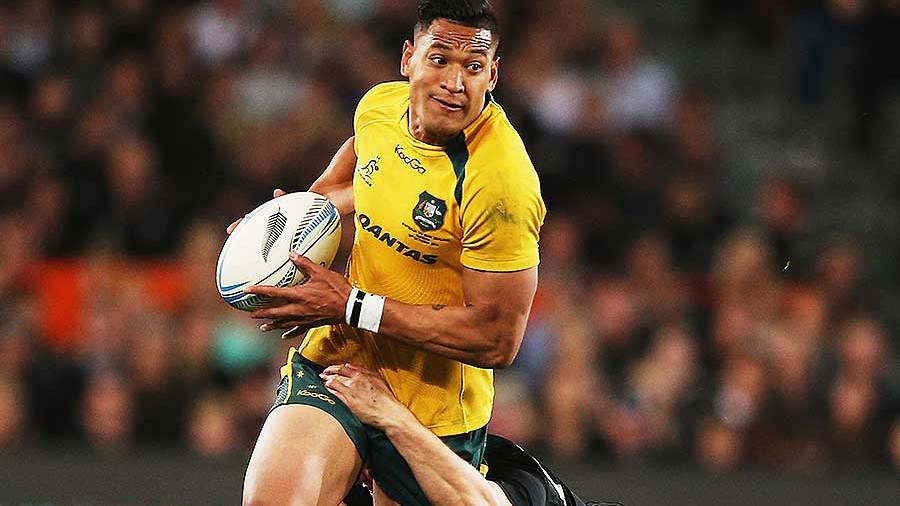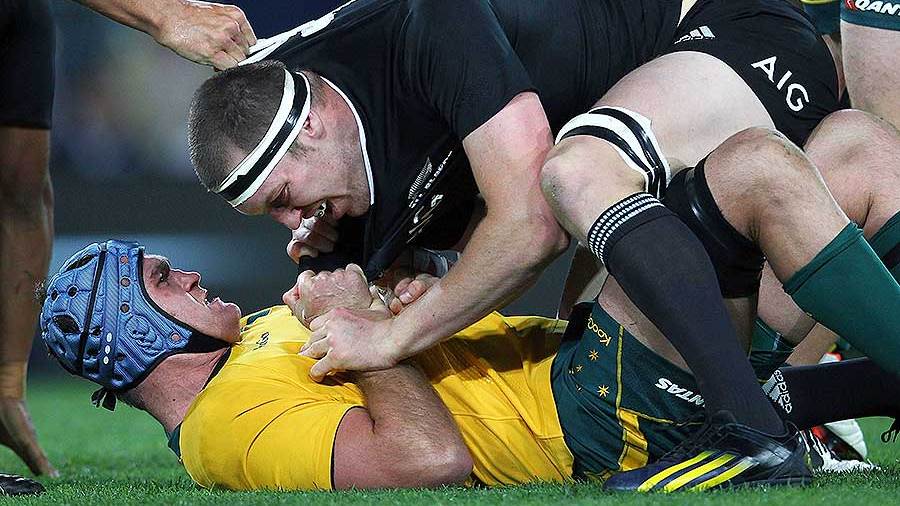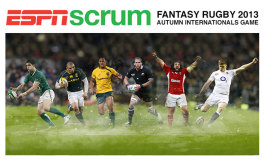|
Greg Growden writes ...
What has happened to James Horwill?
Greg Growden
October 21, 2013

Israel Folau is steadily developing a potent midfield relationship with Quade Cooper © Getty Images
Enlarge
Ewen McKenzie wants more from his Wallabies
%]When the Wallabies were an almighty beast, and it wasn't all that long ago, losing to the All Blacks by eight points would have been regarded as a miserable moment. Not so these days. In these trying times, there is a sense of relief, even a feeling of rejuvenation, when the Wallabies avoid a New Zealand whipping. That has a lot to do with how far the All Blacks are ahead of the rest. Even without so many crucial performers - such as their two best-known figures Daniel Carter and Richie McCaw - they keep producing memorable performances while introducing a steady stream of top-class international players. Their talent pipeline is overflowing - unlike Australia's, which is now at a slow trickle - ensuring they will remain the world's No 1 for quite some time. You can only admire the New Zealand rugby system, and give thanks the Wallabies this time around were not just competitive but also occasionally flustered the All Blacks. The Wallabies return to Australia for a quick rest before heading off for Europe, still bamboozled about how to beat the All Blacks. But at least they are now out of the clueless category. There were enough encouraging signs in Dunedin to indicate they may have learned something positive from all this recent trans-Tasman turmoil. Most crucially, they were reminded of the importance of chancing their arm, and taking risks. Quade Cooper was at his most innovative in Dunedin, and it almost worked. Apart from one wayward speculative pass late in the game, Cooper's service was exemplary; fast, creative, unpredictable, it had the desired effect of unshackling his fullback, Israel Folau, and outside centre, Tevita Kuridrani, who after numerous poor Test appearances picked the right time to show he was up to the pace. While inside centre Matt Toomua was a steadying influence beside the Test No.10, Cooper did his required job and enabled the Wallabies backs to perform. The Wallabies always play best when on the front-foot, pumping the accelerator. That occurred on regular occasions on Saturday night, prompting easily the best attacking football they have shown all year. Cooper and Folau are steadily developing a potent midfield relationship, and that could turn into a dangerous mix in Europe during November. Will Genia also helped by not dilly-dallying around the scrum base, enabling Cooper to indicate the Rugby World Cup 2011 dramas in New Zealand may at last be a distant memory. Yet there remains several major irritants within the Wallabies framework.

James Horwill is struggling to make a impression right now, Greg Growden says © Getty Images
Enlarge
ESPNScrum Fantasy
Enter the Autumn Internationals Fantasy Game © Scrum.com
Good teams revolve around good leaders. The All Blacks have that in McCaw and, in his absence, Kieran Read - who must now be regarded among the top two or three New Zealand No.8s of all time. Read had a massive influence on the Dunedin Test, while the Wallabies captain, in contrast, was not sighted. James Horwill was seen only once during the first half, when he dropped the ball cold. And for the second Test in a row, Horwill was replaced early. Within a few minutes, his replacement, Sitaleki Timani, had done more than Horwill had in the previous hour. Maybe this is the problem of returning from injury too early, but the Wallabies team management must now take a close look at Horwill's position. Now is not the time to change the captain, just before a Grand Slam tour; even though his predecessor, Rocky Elsom, suffered a more excruciating blow when in the most glaring of public lights he was deposed of the skipper duties just before Rugby World Cup 2011. But as soon as David Pocock returns from his lengthy injury break, Wallabies coach Ewen McKenzie should give serious consideration to giving him the Test captaincy; in the past, Pocock has led the Wallabies with aplomb. As well, the Wallabies must do something to improve their defence under pressure, become competitive at the restarts, and discover special magic pills that will suddenly make them He-Men and masters of the breakdown universe - especially after the All Blacks repeatedly blew them away at the tackle with the use of a bit of muscle. Then and only then will you see McKenzie smiling on a regular basis. It's been a while.
Greg Growden talks to Wallabies legend David Campese about the 1984 Grand Slam-winning tourists, and the lessons the current players can learn from their famous predecessors if they are to enjoy similar success in Europe through November. "In 1984, Alan Jones encouraged players to contribute. And you have to remember that in those days the coach was not seen on the field. So we had to sort the problem out, not the coach. "These guys come on nowadays, and it's a case of 'Well what are we going to do now?" They should look upon it as their chance to impress the selectors and get into the starting lineup. You basically have to tell the coach: 'You can't drop me. You have to promote me.'" What advice would Campo give Link McKenzie and his players? Feature live on ESPNscrum on Tuesday, October 22, 2013. © ESPN Sports Media Ltd
|
Live Sports
Communication error please reload the page.
-
Football
-
Cricket
-
Rugby
-
- Days
- Hrs
- Mins
- Secs
F1 - Abu Dhabi GP
Abu Dhabi Grand Prix December 11-131. Max Verstappen ()
2. Valtteri Bottas (Mercedes)
3. Lewis Hamilton (Mercedes)
4. Alexander Albon ()
5. Lando Norris ()
6. Carlos Sainz Jr ()
-
ESPNOtherLive >>
Golf - Houston Open
Snooker - China Open
Tennis - Miami Open

